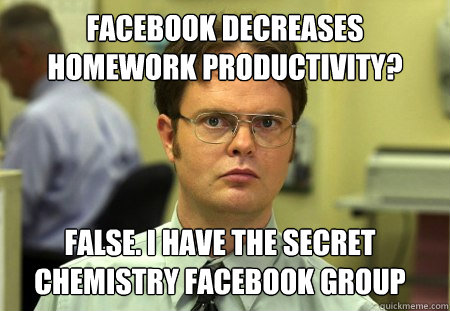Okay, so my blog title is a little misleading. But only a little.
This article wasn't really on my list of favorites (based on the title), but I REALLY enjoyed it and found some reasonable classroom applications worth a try. I feel a little jaded about the whole Facebook thing, primarily because kids seem to spend too much time there. I have been trying to figure out how to use it my advantage, and Stacy Kitsis already had it figured out back in 2008.
This is how I felt about Facebook and homework:
This is how I feel NOW:
Obviously, this last meme is a little over the top. Or is it?
According to Kitsis, teachers just need to treat homework like social networking. Oh, right. Make it more fun and interactive.
Some points from Kitsis I whole-heartedly agree with, but there
I will try to stick with the sandwich theory, but I make no promises.
Verdict?
I absolutely LOVE the practical classroom applications from the article. I even looked up some homework blogs and found a good ones to model in the future. In case you haven't read the article (even though I know you wouldn't read this if you hadn't read the article), here is a quick synopsis: Kitsis basically mimics social media with the homework assignments. Students are paired to complete email exchanges over reading material (the teacher gets copied on correspondence) before large group discussions, projects, or writings. The emails have specific topics and guidelines for everyone. Another approach is the use of a blog with discussion topics. (I especially like the idea of multiple topics from which students can choose.) Students must adequately address the topic or answer the questions AND thoughtfully respond to at least one peer. There are tons of suggestions and rules about anonymity and safety that you can read in the article.
It is almost like tricking the students into enjoying the homework! But it really creates a sense of accountability among peers and fosters collaborative learning. If Vygotksy is right (and I am pretty confident he is), the sociocultural theory of education supports homework as social networking. Only in this case, the social networking benefits students academically instead of just socially.
Kitsis also does a nice job of explaining some potential problems (and solutions) to this technologically savvy homework approach. Problems such as access to computers or Internet, unwilling partners, failing technology, and overly polite critiques are just the beginning. However, most also lead to easy solutions. Allow class time to complete assignments, grade partners individually, allow for technology failures in the schedule, and teach students clear expectations.
Okay, so I messed up the compliment sandwich already and gave away two really great compliments. Now let's talk about what I didn't like. First of all, this article is rather outdated (already). Published in 2008, this article offers a ton of great advice and practical application, but MySpace was part of the article. Sadness. The talk about class wikis also seemed outdated. Emerging technologies like Google Drive offer better collaborative work environments for students. I don't keep up with the latest stuff, so if I know about it, it can't be new. These are small potatoes in the grand scheme of the argument, really.
My biggest beef is this: Why does it always have to be fun and engaging? Kitsis makes it sound like everything in the classroom is always fun. I don't believe that can be true if educators prepare students for life. Life isn't always fun. I don't like to pay my bills. Even online it isn't "fun" to give my money away for water and electricity and Internet service. But I do it. Edutainment has a place in schools, but does it destroy our ability to teach practical skills students need in real life?
Is this where public education is heading?
I better get out my dancing shoes and creative cap if I want to teach. I have to trick them into learning, just like Kitsis did. If you can't beat them, join them. Right?




Good point on edutainment. Do classrooms have to keep up with the always-on distraction/entertainment that mobile gadgets provide? I guess in comparison, a traditional classroom can seem insufferably dull even if there's the potential for a "stimulating" discussion. Parent influence also seems like a pretty important factor...
ReplyDelete